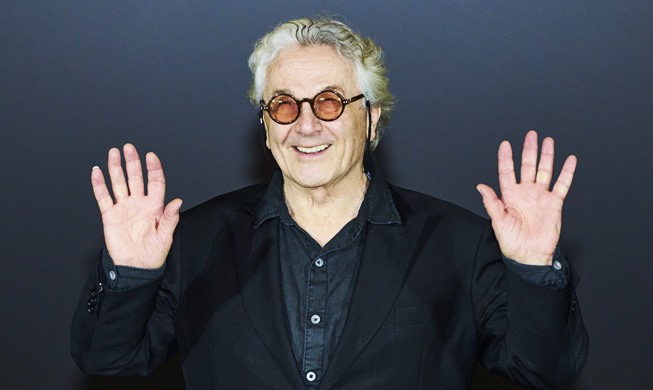-
 Korea.net's 24-hour YouTube channel
Korea.net's 24-hour YouTube channel- NEWS FOCUS
- ABOUT KOREA
- EVENTS
- RESOURCES
- GOVERNMENT
- ABOUT US
“As you said, ‘if we have an ambition, we can wait though there is a very long way to go, despite mountain or sea,’ I am certain that if the two countries gather wisdom and power, there should be a solution,” she added.
President Park’s remarks in Chinese created a cordial mood during the Korea-China summit, and made the Chinese leader smile. President Xi responded that this is his first state visit since being inaugurated as Chinese leader. He expressed gratitude for the warm welcome and hospitality of the Korean government, saying that he was “deeply touched and impressed.”
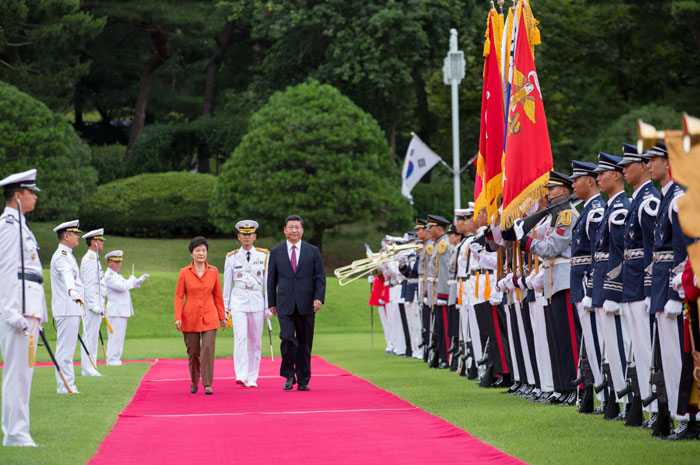
President Park Geun-hye and Chinese President Xi Jinping inspect an honor guard at Cheong Wa Dae on July 3. (photo: Cheong Wa Dae)
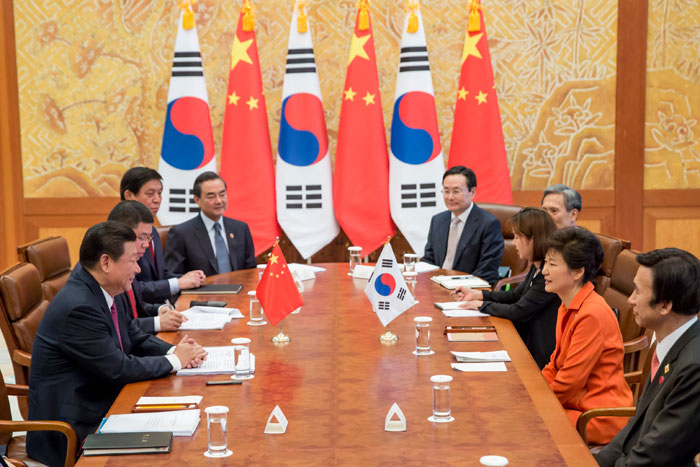
President Park Geun-hye (second from right) and Chinese President Xi Jinping hold the Korea-China summit at Cheong Wa Dae on July 3. (photo: Cheong Wa Dae)
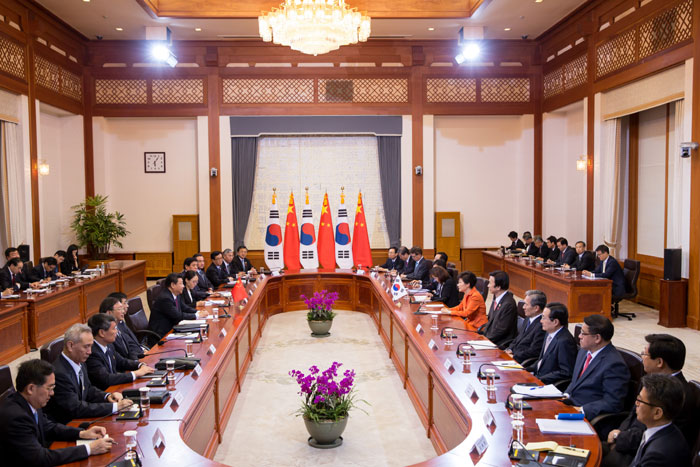
President Park Geun-hye and Chinese President Xi Jinping hold an extended Korea-China summit at Cheong Wa Dae on July 3. (photo: Cheong Wa Dae)
In the extended summit meeting, President Park said, “over the last year, bilateral relations have become firmer and have achieved substantial and quality growth. I am glad that the two governments have communicated closely and cooperated toward the common goal of peace and stability on the Korean Peninsula and in Northeast Asia. I wish we can further develop such cooperation in the future by becoming one mind for one goal as said in the Chinese idiom ‘yidéyixin (一德一心),’” said President Park.
“I would like to give thanks once again for the warm welcome and hospitality of President Park. The official welcoming ceremony has left a particularly deep impression and I am greatly touched,” said President Xi. The Chinese leader then expressed his condolences for the tragic sinking of the ferry Sewol. “There is a Chinese proverb that says ‘A near neighbor is better than a distant cousin.’ Korea also has a similar saying ‘a good neighbor.’ Since China and Korea are very important neighboring countries to each other, we are good partners and friends. China considers the China-Korea relationship to be a very important one. This is my first solo presidential trip to Korea,” said President Xi, emphasizing the close Seoul-Beijing ties.
Korea, China support denuclearization, extend economic cooperation
After holding the summit meetings at Cheong Wa Dae, the two leaders adopted a joint statement which contained a determined stance in opposition to the nuclear weapons program of North Korea.
In the statement, the two leaders agreed to further develop bilateral relations based on a joint statement signed this year and the Joint communiqué for the Korea-China future vision, which the two countries signed last year. These two joint statements contain agreements between the two countries, which agreed to become partners in order to mutually develop, contribute to regional peace and development of Asia and promote the prosperity of the world.
To this goal, based on mutual trust, the two countries agreed to establish more developed strategic partnership relations so that the two countries can closely discuss issues of common interest as well as long-term issues. Both Seoul and Beijing agreed to strengthen cooperation to boost peace and stability on the Korean Peninsula and in Northeast Asia.
The two leaders agreed to expand economic cooperation and trade, with an eye on the future through creativity and innovation, in order to enhance the quality of life of the peoples of both countries. Both leaders shared the vision of playing the role of locomotive for growth of both the regional and world economy. They agreed to achieve this by making efforts toward the economic integration of the Northeast Asian region and the world.
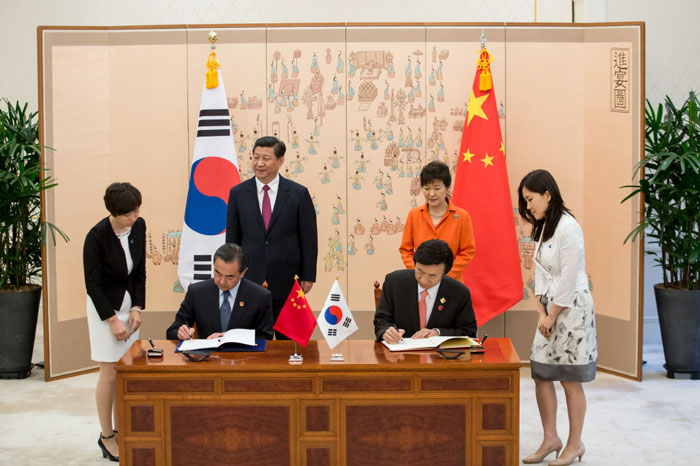
President Park Geun-hye and Chinese President Xi Jinping attend a signing ceremony between the foreign ministers of the two countries at Cheong Wa Dae on July 3. (photo: Cheong Wa Dae)
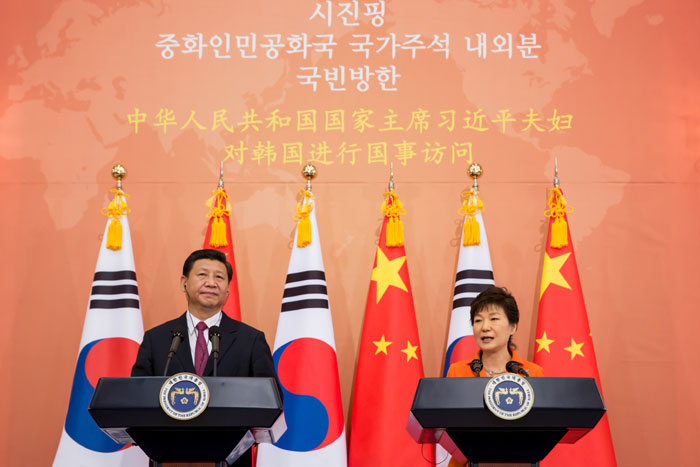
President Park Geun-hye (right) and Chinese President Xi Jinping hold a joint press conference at Cheong Wa Dae on July 3. (photo: Cheong Wa Dae)
Seoul, Beijing boost cultural exchange, support trust-building process
The two countries agreed to establish heart-to-heart, trust-based relations by boosting two-way people-to-people and cultural exchanges and deepening the emotional bonds between the two peoples. The two sides shared a common understanding on the need of six-party talks. They agreed that the countries affected by the talks should respect and strengthen communication by both bilateral and multilateral means. The ultimate goal in mind is to achieve denuclearization of the Korean Peninsula and solve issues of common interest, based on the September 19 Joint Statement.
The Korean government aims to build mutual trust between Seoul and Pyongyang through the Korean Peninsula trust-building process, in order to advance inter-Korean relations and take the peace root in the region. South Korea emphasized that the two Koreas need to take steps to solve humanitarian issues on both sides, and build infrastructure for the livelihood of those affected, while narrowing the emotional gap between them. Seoul stressed that such steps will contribute to the peaceful unification of the Korean Peninsula and co-prosperity of Northeast Asia.
To this aim, China highly valued the efforts of South Korea in improving inter-Korean relations. Beijing supported Seoul’s vision in which the two Koreas can boost relations, reconcile and cooperate through dialogue. The Chinese leader respected and supported the desire of the Korean people to achieve the ultimate goal of a peaceful unification.
China reaffirmed that there is only one China in the world and Taiwan is an inseparable part of the Chinese territory. Seoul expressed an understanding and respect for Beijing’s position in this regard. The Korean government expressed support China’s standpoint in which the People’s Republic of China is the only legitimate government that represents China and its "One China" view. Seoul further supported peaceful development in Cross-Strait relations.
Both China and Korea viewed positively the progress being made in negotiations for a free trade agreement (FTA) at an integrated level, and agreed to bolster efforts to conclude the deal within this year. Both countries also agreed to make active efforts to establish a direct system where the Korean won and the Chinese yuan can be traded. The two governments further agreed to achieve a people-to-people exchange volume of 10 million by 2016. They also agreed to take steps to negotiate an extension of the visa-wavering range for both peoples. In this regard, they agreed to designate 2015 and 2016 as the “Years of China·Korea Visit.”
By Wi Tack-whan, Yoon Sojung
Korea.net Staff Writers
whan23@korea.kr
Most popular
- First hearing-impaired K-pop act hopes for 'barrier-free world'
- 'Mad Max' director impressed by 'cinema-literate' Korean viewers
- Romanian presidential couple visits national cemetery
- President Yoon, Japan PM pledge better trilateral ties with US
- President, Romania pledge better defense, nuclear power ties




